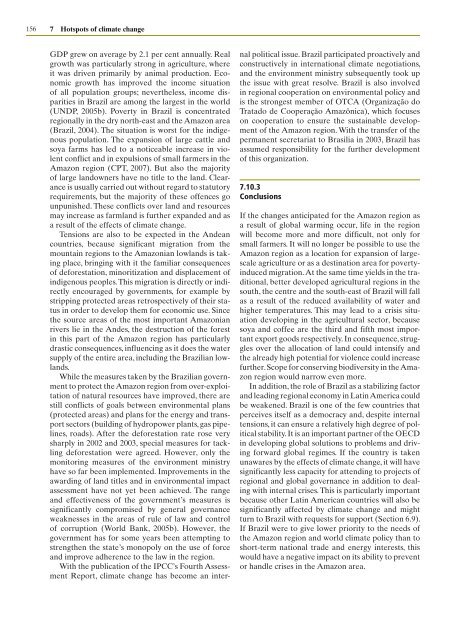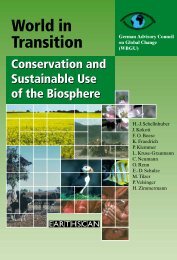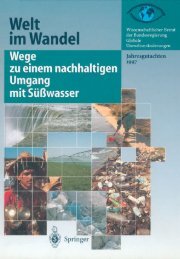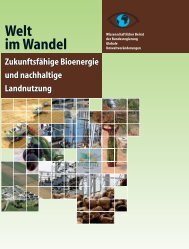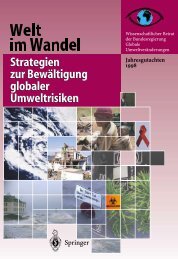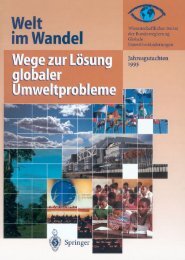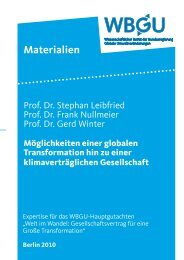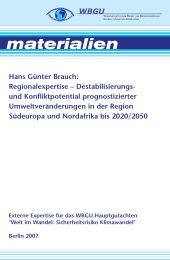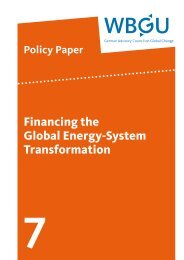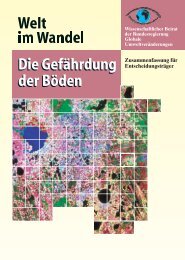World in Transition: Climate Change as a Security Risk - WBGU
World in Transition: Climate Change as a Security Risk - WBGU
World in Transition: Climate Change as a Security Risk - WBGU
Create successful ePaper yourself
Turn your PDF publications into a flip-book with our unique Google optimized e-Paper software.
156<br />
7 Hotspots of climate change<br />
GDP grew on average by 2.1 per cent annually. Real<br />
growth w<strong>as</strong> particularly strong <strong>in</strong> agriculture, where<br />
it w<strong>as</strong> driven primarily by animal production. Economic<br />
growth h<strong>as</strong> improved the <strong>in</strong>come situation<br />
of all population groups; nevertheless, <strong>in</strong>come disparities<br />
<strong>in</strong> Brazil are among the largest <strong>in</strong> the world<br />
(UNDP, 2005b). Poverty <strong>in</strong> Brazil is concentrated<br />
regionally <strong>in</strong> the dry north-e<strong>as</strong>t and the Amazon area<br />
(Brazil, 2004). The situation is worst for the <strong>in</strong>digenous<br />
population. The expansion of large cattle and<br />
soya farms h<strong>as</strong> led to a noticeable <strong>in</strong>cre<strong>as</strong>e <strong>in</strong> violent<br />
conflict and <strong>in</strong> expulsions of small farmers <strong>in</strong> the<br />
Amazon region (CPT, 2007). But also the majority<br />
of large landowners have no title to the land. Clearance<br />
is usually carried out without regard to statutory<br />
requirements, but the majority of these offences go<br />
unpunished. These conflicts over land and resources<br />
may <strong>in</strong>cre<strong>as</strong>e <strong>as</strong> farmland is further expanded and <strong>as</strong><br />
a result of the effects of climate change.<br />
Tensions are also to be expected <strong>in</strong> the Andean<br />
countries, because significant migration from the<br />
mounta<strong>in</strong> regions to the Amazonian lowlands is tak<strong>in</strong>g<br />
place, br<strong>in</strong>g<strong>in</strong>g with it the familiar consequences<br />
of deforestation, m<strong>in</strong>oritization and displacement of<br />
<strong>in</strong>digenous peoples. This migration is directly or <strong>in</strong>directly<br />
encouraged by governments, for example by<br />
stripp<strong>in</strong>g protected are<strong>as</strong> retrospectively of their status<br />
<strong>in</strong> order to develop them for economic use. S<strong>in</strong>ce<br />
the source are<strong>as</strong> of the most important Amazonian<br />
rivers lie <strong>in</strong> the Andes, the destruction of the forest<br />
<strong>in</strong> this part of the Amazon region h<strong>as</strong> particularly<br />
dr<strong>as</strong>tic consequences, <strong>in</strong>fluenc<strong>in</strong>g <strong>as</strong> it does the water<br />
supply of the entire area, <strong>in</strong>clud<strong>in</strong>g the Brazilian lowlands.<br />
While the me<strong>as</strong>ures taken by the Brazilian government<br />
to protect the Amazon region from over-exploitation<br />
of natural resources have improved, there are<br />
still conflicts of goals between environmental plans<br />
(protected are<strong>as</strong>) and plans for the energy and transport<br />
sectors (build<strong>in</strong>g of hydropower plants, g<strong>as</strong> pipel<strong>in</strong>es,<br />
roads). After the deforestation rate rose very<br />
sharply <strong>in</strong> 2002 and 2003, special me<strong>as</strong>ures for tackl<strong>in</strong>g<br />
deforestation were agreed. However, only the<br />
monitor<strong>in</strong>g me<strong>as</strong>ures of the environment m<strong>in</strong>istry<br />
have so far been implemented. Improvements <strong>in</strong> the<br />
award<strong>in</strong>g of land titles and <strong>in</strong> environmental impact<br />
<strong>as</strong>sessment have not yet been achieved. The range<br />
and effectiveness of the government’s me<strong>as</strong>ures is<br />
significantly compromised by general governance<br />
weaknesses <strong>in</strong> the are<strong>as</strong> of rule of law and control<br />
of corruption (<strong>World</strong> Bank, 2005b). However, the<br />
government h<strong>as</strong> for some years been attempt<strong>in</strong>g to<br />
strengthen the state’s monopoly on the use of force<br />
and improve adherence to the law <strong>in</strong> the region.<br />
With the publication of the IPCC’s Fourth Assessment<br />
Report, climate change h<strong>as</strong> become an <strong>in</strong>ter-<br />
nal political issue. Brazil participated proactively and<br />
constructively <strong>in</strong> <strong>in</strong>ternational climate negotiations,<br />
and the environment m<strong>in</strong>istry subsequently took up<br />
the issue with great resolve. Brazil is also <strong>in</strong>volved<br />
<strong>in</strong> regional cooperation on environmental policy and<br />
is the strongest member of OTCA (Organização do<br />
Tratado de Cooperação Amazônica), which focuses<br />
on cooperation to ensure the susta<strong>in</strong>able development<br />
of the Amazon region. With the transfer of the<br />
permanent secretariat to Br<strong>as</strong>ilia <strong>in</strong> 2003, Brazil h<strong>as</strong><br />
<strong>as</strong>sumed responsibility for the further development<br />
of this organization.<br />
7.10.3<br />
Conclusions<br />
If the changes anticipated for the Amazon region <strong>as</strong><br />
a result of global warm<strong>in</strong>g occur, life <strong>in</strong> the region<br />
will become more and more difficult, not only for<br />
small farmers. It will no longer be possible to use the<br />
Amazon region <strong>as</strong> a location for expansion of largescale<br />
agriculture or <strong>as</strong> a dest<strong>in</strong>ation area for poverty<strong>in</strong>duced<br />
migration. At the same time yields <strong>in</strong> the traditional,<br />
better developed agricultural regions <strong>in</strong> the<br />
south, the centre and the south-e<strong>as</strong>t of Brazil will fall<br />
<strong>as</strong> a result of the reduced availability of water and<br />
higher temperatures. This may lead to a crisis situation<br />
develop<strong>in</strong>g <strong>in</strong> the agricultural sector, because<br />
soya and coffee are the third and fifth most important<br />
export goods respectively. In consequence, struggles<br />
over the allocation of land could <strong>in</strong>tensify and<br />
the already high potential for violence could <strong>in</strong>cre<strong>as</strong>e<br />
further. Scope for conserv<strong>in</strong>g biodiversity <strong>in</strong> the Amazon<br />
region would narrow even more.<br />
In addition, the role of Brazil <strong>as</strong> a stabiliz<strong>in</strong>g factor<br />
and lead<strong>in</strong>g regional economy <strong>in</strong> Lat<strong>in</strong> America could<br />
be weakened. Brazil is one of the few countries that<br />
perceives itself <strong>as</strong> a democracy and, despite <strong>in</strong>ternal<br />
tensions, it can ensure a relatively high degree of political<br />
stability. It is an important partner of the OECD<br />
<strong>in</strong> develop<strong>in</strong>g global solutions to problems and driv<strong>in</strong>g<br />
forward global regimes. If the country is taken<br />
unawares by the effects of climate change, it will have<br />
significantly less capacity for attend<strong>in</strong>g to projects of<br />
regional and global governance <strong>in</strong> addition to deal<strong>in</strong>g<br />
with <strong>in</strong>ternal crises. This is particularly important<br />
because other Lat<strong>in</strong> American countries will also be<br />
significantly affected by climate change and might<br />
turn to Brazil with requests for support (Section 6.9).<br />
If Brazil were to give lower priority to the needs of<br />
the Amazon region and world climate policy than to<br />
short-term national trade and energy <strong>in</strong>terests, this<br />
would have a negative impact on its ability to prevent<br />
or handle crises <strong>in</strong> the Amazon area.


